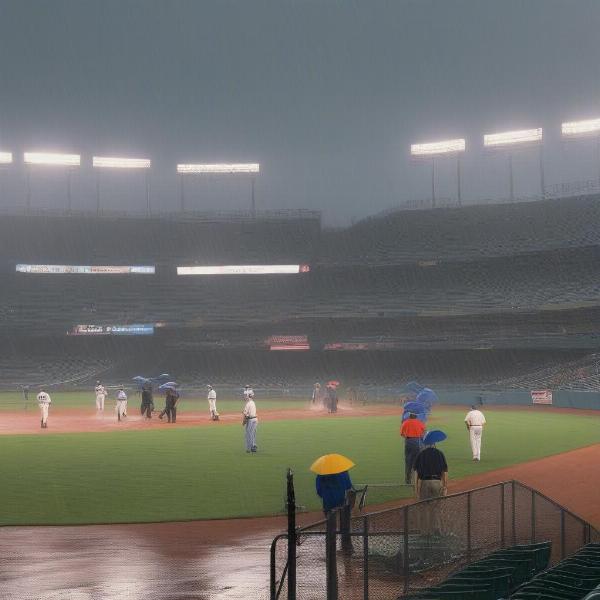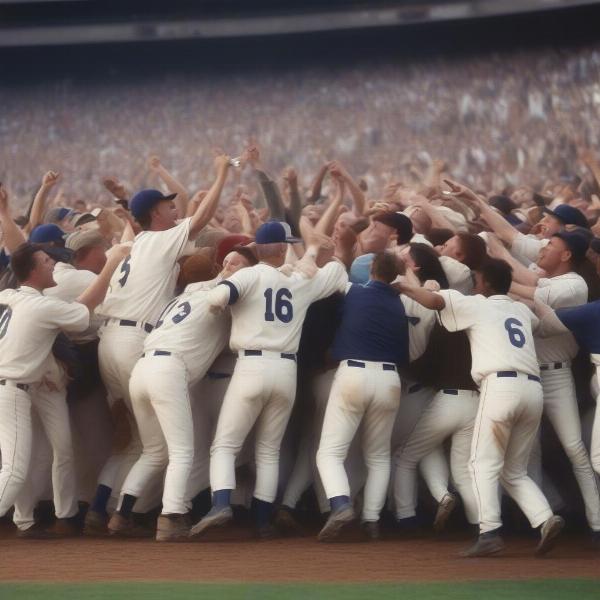A baseball game, unlike many other sports, doesn’t have a set timer. This leads to the question: how many endings are there in a baseball game? The answer, while seemingly simple, has a few layers to it. At its core, there’s one true ending: one team wins, and the other loses. But the paths to that single conclusion are diverse and fascinating.
After the regulation nine innings, if one team has more runs than the other, the game ends. Pretty straightforward, right? That’s the most common scenario. But what if the score is tied after nine innings? That’s where things get interesting. We enter extra innings, and the game continues until one team emerges victorious. This can lead to some truly epic battles, with games stretching into extra innings, sometimes even beyond what anyone could have predicted. This seemingly simple question about endings unveils the dynamic and unpredictable nature of baseball.
Understanding the Different Ways a Baseball Game Can End
Let’s delve into the nuances of how a baseball game can conclude. While the ultimate goal is to outscore your opponent, the paths to victory can vary, creating different “endings” within the larger context of the game.
Regulation Win
This is the most common type of ending. After nine innings, one team has more runs, and the game concludes. Simple and satisfying.
Walk-Off Win
This dramatic ending occurs in the bottom of the ninth inning (or any extra inning) when the home team scores the winning run. Imagine the bases loaded, two outs, and the batter smacks a game-winning hit. The crowd goes wild, and the game ends instantly. This is the stuff of baseball legend.
Extra Innings Win
When the score remains tied after nine innings, the game goes into extra innings. Each inning is played as usual until one team finally breaks the tie. These extended contests can test the endurance and mental fortitude of both teams, sometimes leading to unexpected heroes and heartbreaking defeats.
Called Game
Occasionally, games can be called before nine innings are completed, usually due to weather conditions. If enough innings have been played (typically five), the game is considered official, and the team with the higher score at the time the game is called is declared the winner. This can be a frustrating ending for fans and players alike, especially if a comeback was brewing.
 Baseball Game Called Due to Rain
Baseball Game Called Due to Rain
There are other, less common ways a baseball game can end, such as forfeits or protests, but these rarely occur. Understanding the different scenarios adds another layer to appreciating the strategic complexities and unpredictable nature of the sport. It’s not just about outscoring your opponent; it’s about how you achieve that ultimate goal.
How Extra Innings Impact the Number of Potential Endings
Extra innings add an element of unpredictability to how many endings are possible in a baseball game. Theoretically, a game could go on indefinitely, creating countless potential scenarios. Of course, this is unlikely, but the possibility highlights the exciting open-endedness of baseball. Similar to how to watch twins game, the length of the experience can significantly vary.
The Role of Strategy in Extra Innings
As games stretch into extra innings, managerial strategies become even more critical. Decisions about pitching changes, pinch hitters, and defensive positioning can have a magnified impact on the outcome. Each move becomes a potential game-changer, adding to the drama and excitement of extra-inning baseball.
The Mental Game of Extra Innings
The mental aspect of extra innings can be as crucial as the physical one. Players must maintain their focus and composure under increasing pressure. The longer the game goes, the more each pitch, each hit, each play takes on added significance.
The impact of extra innings on the potential “endings” of a baseball game reinforces the dynamic and ever-shifting nature of the sport. It’s this unpredictability that keeps fans on the edge of their seats, never knowing what might happen next.
Why Knowing About Baseball Endings Matters
Understanding the various ways a baseball game can end isn’t just for trivia buffs. It enhances your appreciation of the sport’s strategic depth and dramatic possibilities. Knowing about walk-offs, extra innings, and called games allows you to follow the game with a more informed perspective.
Appreciating the Nuances of the Game
Knowing how many endings are possible in a baseball game, and the different ways they can unfold, allows you to appreciate the nuances and intricacies of the sport. It’s not just about the final score; it’s about the journey to get there. Much like understanding who won game 1 world series, the details behind the outcome matter.
Enhancing the Viewing Experience
Whether you’re a seasoned fan or a casual observer, understanding the different endings in baseball enriches the viewing experience. You’ll be able to anticipate potential scenarios, appreciate the strategic decisions made by managers, and savor the drama of those nail-biting finishes. Just like when you’re figuring out how to listen to the cubs game, understanding the game itself enhances the experience.
 Fans Celebrating Walk-Off Win
Fans Celebrating Walk-Off Win
Other Factors Influencing the Game’s Outcome
Beyond the standard ways a game can end, several other factors can influence a baseball game’s outcome. These factors add another layer of complexity and strategy to the sport.
The Importance of Pitching
A dominant pitching performance can completely shut down an opposing team’s offense, leading to a low-scoring game and increasing the likelihood of extra innings. Conversely, a struggling pitcher can lead to a high-scoring affair. The pitching matchup is often a key element in predicting the flow of a game. This is similar to the importance of knowing can you bet on a game after it starts, as pitching performance can heavily influence betting odds.
Defensive Prowess
Solid defense can be just as impactful as a powerful offense. A team that makes spectacular plays in the field can prevent runs and keep the game close, while errors can be costly, especially in tight situations.
The Element of Luck
While skill and strategy are paramount in baseball, luck also plays a role. A bloop single, a bad hop, or a close call at a base can all impact the outcome of a game. This element of chance is part of what makes baseball so unpredictable and exciting. Similar to trying to how to watch the dodger game live for free, sometimes it’s a matter of chance and timing.
Conclusion
So, how many endings in a baseball game? While there’s only one definitive outcome – a win or a loss – the ways to reach that conclusion are numerous and varied, making each game a unique story. From regulation wins to walk-off thrillers and extra-inning marathons, the unpredictable nature of baseball is what keeps fans coming back for more. Understanding these different scenarios enhances your appreciation for the sport and adds to the excitement of every pitch, every inning, and every game. What will the ending be tonight? Tune in and find out!
FAQ
-
What is a walk-off win in baseball? A walk-off win occurs when the home team scores the winning run in the bottom of the ninth inning or any extra inning, ending the game immediately.
-
How long can a baseball game last? Theoretically, a baseball game could go on indefinitely in extra innings. However, the longest professional baseball game in history lasted 33 innings.
-
What happens if a baseball game is tied after nine innings? The game continues into extra innings until one team scores more runs than the other in a complete inning.
-
Can a baseball game end in a tie? In regular season Major League Baseball, games can end in a tie due to weather or other extraordinary circumstances, but these are rare. Tie games are more common in other levels of baseball.
-
What is a called game in baseball? A called game is a game that ends prematurely, usually due to weather. If enough innings have been played (typically five), the game is considered official, and the team with the lead wins.
-
Why are extra innings so exciting in baseball? Extra innings heighten the tension and drama of a baseball game, with every play carrying greater weight. The strategic decisions become even more critical, and the mental game plays a significant role.
-
How does understanding the different endings in baseball enhance the viewing experience? Knowing the various ways a game can end allows fans to appreciate the strategic depth and dramatic possibilities of the sport, making the experience more engaging and insightful.

